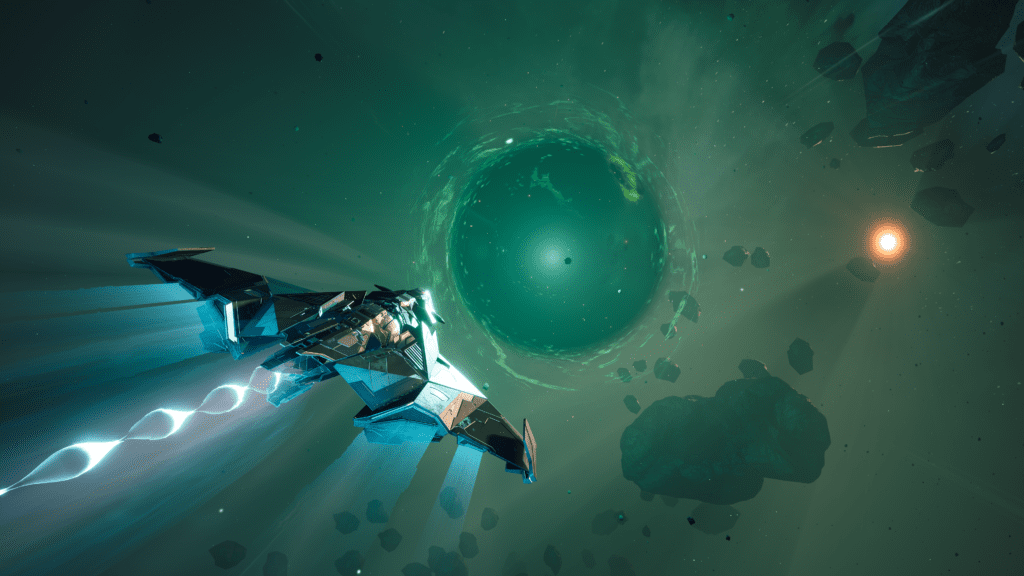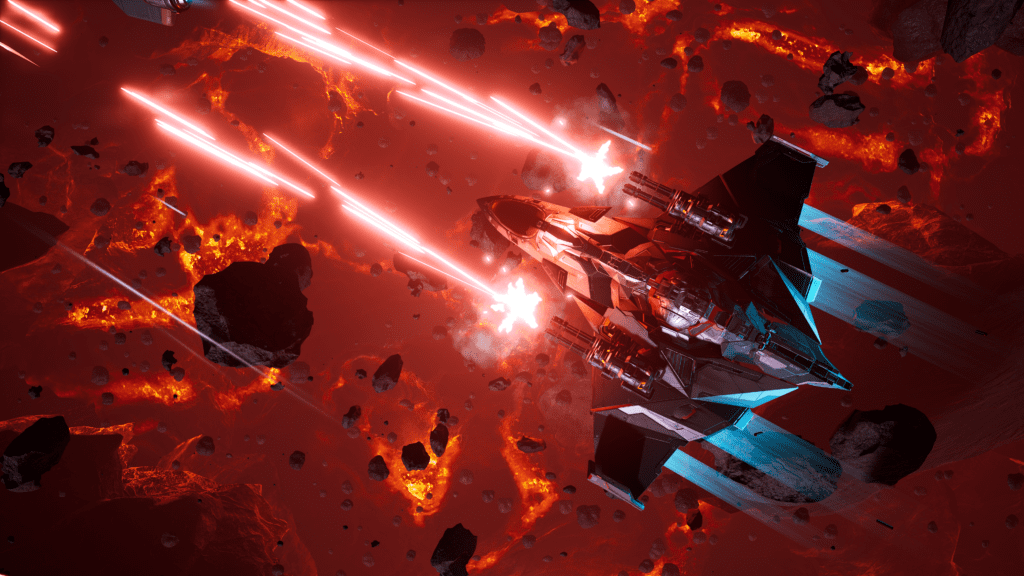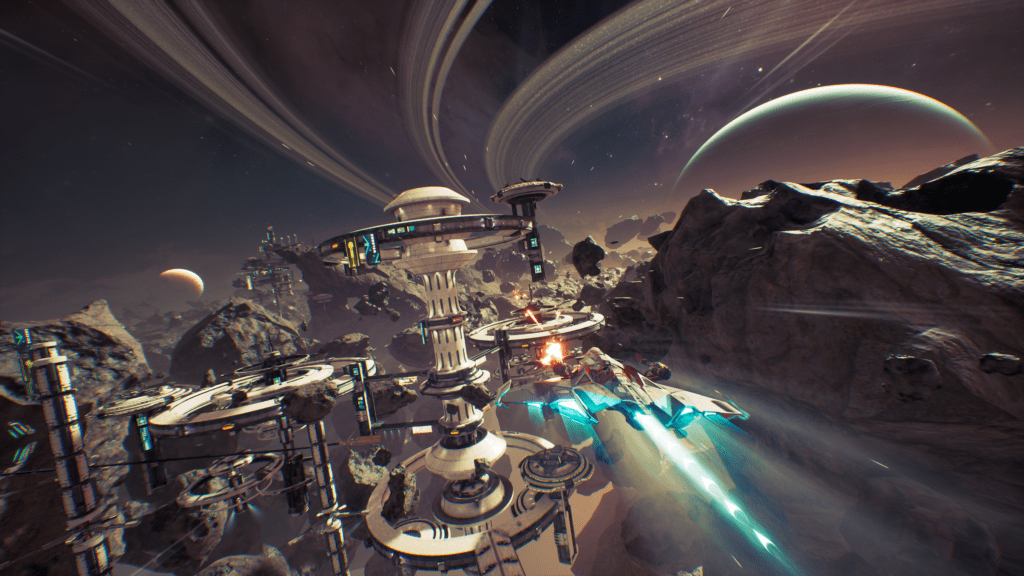Space shooters were once a dime a dozen, and I fondly remember the days when one out of every so many games was a spaceship shooter. Warm memories of flying around in space in games like Colony Wars and Darklight Conflict are brought up when I see a new spaceship combat game. Even titles like Star Trek: Invasion provided such enjoyable memories as well, flying inside a Borg cube in a Federation combat fighter, and destroying Romulans as a Federation turret gunner.
Today, there aren’t many spaceship games, if at all out there. In fact, the last genuine spaceship combat game I played was a small and entertaining title, Subdivision Infinity DX. The only other one on the market is Rebel Galaxy: Outlaw, and its predecessor, Rebel Galaxy, though that deals with naval ship combat in real-time as opposed to small interceptor-based combat. Then, there is Chorus, an ambitious title that immediately grabbed my attention for its visual fidelity and the fact that it was a spaceship action game, with a focus on small, interceptor combat, fighting foes across a desolate and strange space. After spending many hours with it, I can safely say that Chorus is certainly one of my favorite games so far.
Chorus is a spaceship combat game, taking place in a strange and almost fantastical interpretation of space, where pilots with special abilities fly in a universe filled with humans scraping by in mining installations, and a sinister army can alter the mental status of humans through weaponized technology. Players star as Nara, an elite and gifted pilot with a bevy of abilities and attributes. She was an elite member of The Circle an armed and dangerous cult that spread its message of unity and corrupt power throughout the galaxy. Nara is gifted with a variety of cybernetic and genetic augmentations that allow her to not only gain an exceptional skill in flying but also unnatural powers. She can synchronize wither ship, feel its circuits and systems, and use her mind to achieve special abilities, such as space drifting and even reading memories left by the trails of ships in space. One fateful mission has Nara using her power to literally destroy an entire planet. Ashamed at the sins she committed, she fled and severed contact with The Circle. Nara flees to a small frontier outpost, filled with miners and explorers, helping them out in contending with pirates and securing older installations. Suddenly, The Circle enters the system, deploying their psychological weapons to enslave and ensnare. Nara is successful in repelling them but now understands that in order to free herself and protect the innocent, she must embrace her sins once more.
Players take to the stars in a small, interceptor craft, able to engage various targets and maneuver with great speed. The introduction of the game introduces players to the protagonist, as well as the basic controls for handling the ship and firing weapons. Players start off in a basic, small craft, which is able to maneuver fast enough to defeat the basic defense system and enough firepower to punch holes in weaker crafts. Over the course of the story, players gain access to a mysterious sentient ship, known as Forsaken. Forsaken and Nara have had a deep history, lending to the mystery of Forsaken as no mere AI can perform what he can perform. However, the two are strong and in sync, dedicated to hunting and punishing all that stand in their way. Forsaken is in a larger ship, with more enhanced maneuverability and powers. These powers and abilities can be unlocked through playing the single-player, but the weapons and modifications can be upgraded to provide enhanced firepower.
Players begin in a hub world of sorts, a massive asteroid belt with civilians. Players can help and assist other civilians and their missions, which help support the overall sanctuary, while also gaining experience and credits in the process. Of course, the primary missions can be taken on at any time and are the key to progressing through the game. Between missions, players can land and upgrade their vessels.
The biggest highlight of Chorus is the combat, and it is overwhelmingly satisfying to hop back into the cockpit and live my Star Wars fantasies. Of course, I am aware that Star Wars: Squadrons exists and if I want to fly around in an X-Wing, I can just play that game, but there was something so incredibly charming of having that same cinematic feel in a different universe, and in the case of Chorus, it is excellent! Earlier battles provide a sharp thrill, including the ability to literally drift through temples and around enemies, making a total joke out of the foes that oppose you. Players hear Nara exclaiming to herself the combat situation. Every ship destroyed or every hit she takes has her shout a statement, and the radio chatter enhances that frantic feeling as well. It’s a small touch but a very welcome one Shooting even the basic Gatling gun has strong feedback and has a sensation of weight and moment. Subsequently, using the other weapons, like the plasma cannons, also feels appropriate. The combat can feel frantic and unpredictable, and even though Nara is a gifted pilot, she can still be completely destroyed in a hail of laser fire, so using maneuvers and speed is essential. Fighting smaller enemies and stationary targets is satisfactory, but it is when all-our war occurs where Chorus really shines. Bases, large ships, a multitude of enemy fights, all make for wildly enjoyable combat, each one adding its own host of challenges to conquer. Shooting and fighting won’t be all that players do. Investigations, exploring ancient temples, and even racing are part of some of the activities players can partake in.
Another big mechanic to the space combat of Chorus is the Rites. Nara was endowed with a series of Rites that allowed her great, nearly god-like abilities. As she reactivates them, she gains newfound powers that can aid her in combat. One such Rite allows Nara to capture an enemy ship, then fling it at others or into an object, like a high-flying gravity gun. Another Rite sends Nara into a destructive speed frenzy, penetrating and obliterating vessels. These rites do add a unique perspective to the traditional spaceship combat, and for me, is reminiscent of the unique spaceship combat featured in Star Wars: Jedi Starfighter a similar game in gameplay where players used traditional lasers in conjunction with force powers. It’s a unique take on spaceship combat and fits well with the overall setting. Overall, Chorus has strong, excellent space combat, fitting and expected as the developer, Fishlabs, worked on the Galaxy on Fire games for mobile in the past decade. The only grievance is the controls. They work fine and are functional, but it does take getting used to, especially when learning to drift.
Chorus is the first true Xbox Series X game I have played, since I just got one over the holidays, and visually, the game is earth-shattering and stunning. The void of space feels like a mysterious, yet beautiful black gulf of emptiness and wonderment. Planets fill the entire horizon, with their vibrant rings, and strange alien structures jut from the dark. It’s a game that reminds players of the visual wonderment of games and puts a lot of depth and mystery into space. There’s a strong sense of being out in the open and in the unknown. Part of my feelings are fueled by nostalgia for the Colony Wars trilogy, but even without it, the game is a visual wonderment. Even the artistic designs of the ships, characters, and even the boss fights are sharp. Nara has a very distinctive look as well, though my criticism is her outfit might be a bit too generic, with the browns and the black of her combat suit. This criticism holds for the first portions of the game, being in the asteroid belt, but later on, Chorus becomes far more distinct.
While the gameplay and visual aspects of Chorus are splendor and certainly worth the price of admission, where Chrous needs work is in its story and execution. The story of Chorus feels like the middle installment to a game franchise that has been around for a long while, and that there may have been a game or two beforehand. Chorus drips with lore, but there is so much of it, and so much we don’t know, that it doesn’t really leave room for character development, or the ability to find out the hows and why of certain aspects. Forsaken, for example, is an amazing character as a sentient intelligence that is able to sync with the thought patterns of Nara. How did Forsaken become a sentient ship? Is he an AI or a human uploaded into a mainframe like Christopher Brookmyre’s Bedlam or the cyborgs of Ghost in The Shell? Even Nara’s powers aren’t quite fully explained as to how she can do what she can do and why. If Chorus had more time and a bigger budget, cut scenes or some kind of logbook or audio logs could have fleshed out more of the hows and the why of the universe in Chorus.
The overall story could be told better. Perhaps Chorus could have been a standalone story that could leave room for future installments as opposed to feeling like the middle of a trilogy. For comparison, while Chorus may have its troubles in the storytelling department, it is nowhere near the incomprehensible and outright broken storytelling of games like Gene Rain, which I simply could not play anymore, between the non-functional gameplay and an entirely non-cohesive story, if you can call it that. A big respect Chorus is using voice acting to convey its story. A game this ambitious could not be told through text boxes and I respect and appreciate the hard work the voice cast went into Chorus.
There will be some that take issue with Nara and her self-redemption arc as her conscious seems to be awakened after she obliterates a planet, but until that point, was okay with everything else. However, as a supporter of expression and indie storytelling, such a take is far too maligned. In her defense, this is a science fiction story, and the viewpoints of right and wrong, as well as the battle within the human conscious takes on an entirely new meaning within this context. Nara is essentially a superweapon and a demi-god, but she is vulnerable. Power, and its effect on people, are vastly different within the context of Chorus as opposed to the norms we abide by regarding humans and power in the real world. In this depiction of humanity in the future, consciousness and the conflicts of morals and ethics, are far different. The story of Nara and Forsaken is at the very least interesting and entertaining, and should the studio revisit this game, or even space shooters in the future, I can see a certain improvement. As for the gameplay, there’s only so much you can do with spaceship combat games, and the combat in Chorus is incredibly strong, but I can easily imagine refinements to the mechanics, such as new powers, different ships, and so on. Finally, Chorus could have been perhaps a bit longer. Chorus clocks in at about 14 hours, and perhaps longer for those wishing to complete side quests and gather achievements and trophies. It’s a good length, considering some games in this genre can be far shorter, but it could be longer, even if just for a few additional hours.
We need more spaceship combat games out in the game space today, and Chorus is a very welcome one, with gorgeous visuals and top-notch gameplay. While the execution of storytelling is flawed, it’s also interesting and refreshingly different, functioning well enough to be worth getting into. The presentation, voice acting, and visual scope of the game are all well done, providing a thrilling space opera epic. I’m a believer that we need more games to stand out, be bold, even if they are flawed, all in the name of interacting with new experiences. Chorus isn’t perfect but it is a commendable effort, and the gameplay is strong to lift the spirits of those looking for something bold, and for players that have fond memories hopping into a starship as kids. In fact, should an opportunity for a game-themed to The Last Starfighter were to arrive, I’d personally be the ones to recommend Fishlabs for this effort, based upon what I saw with Chorus. Gather around and sing across the stars. Chorus is a good time.
A review code for Chorus was provided for review purposes.








